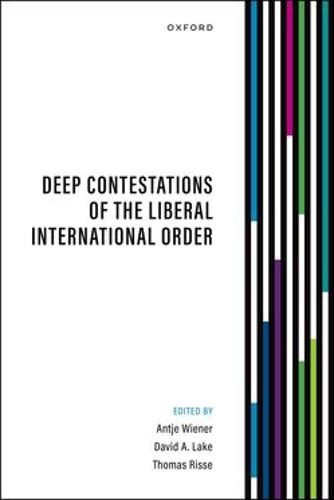Readings Newsletter
Become a Readings Member to make your shopping experience even easier.
Sign in or sign up for free!
You’re not far away from qualifying for FREE standard shipping within Australia
You’ve qualified for FREE standard shipping within Australia
The cart is loading…






This is an open access title available under the terms of a CC BY-NC-ND 4.0 International licence. It is free to read at Oxford Academic and offered as a free PDF download from OUP and selected open access locations.
The liberal international order (LIO) is deeply contested. This book distinguishes between "normal" and "deep" contestation: the former represents necessary engagement with norms in everyday policy-making and politics. "Normal" contestations are constitutive for any liberal orders, including the LIO. "Deep" contestations, however, typically target core principles, norms, and institutions of an order itself and can lead to order change or collapse. Putin's invasion of Ukraine or Trump's attacks on the rule-based international economic order are examples of current deep contestations. The chapters in this book argue that the drivers of these contestations are the built-in contradictions and broken promises of the LIO itself: intrusiveness (without inclusiveness), (economic and other) inequalities, and incapacity (to solve global governance problems such as climate change). The LIO is also challenged by the "axis of autocracies" (e.g. Russia and China) and their transnational alliances with authoritarian right-wing populism in liberal democracies in the US and in Europe. However, even deep contestations do not spell the end of an order per se. The LIO's survival depends on its resilience understood as the capacity to change and adapt when faced with major challenges. The volume projects several scenarios for the future and discusses the factors that will determine the LIO's resilience.
This volume has emerged from research carried out as part of the Cluster of Excellence "Contestations of the Liberal Script - SCRIPTS", which analyzes the contemporary controversies about liberal ideas, institutions, and practices on the national and international level from a historical, global, and comparative perspective. It connects academic expertise in the social sciences and area studies and collaborates with research institutions in all world regions. Operating since 2019 and funded by the German Research Foundation (DFG), SCRIPTS unites eight major Berlin-based research institutions: Freie Universitaet Berlin, the Humboldt-Universitaet zu Berlin, the Berlin Social Science Center (WZB), the Hertie School, the German Institute for Economic Research (DIW), the Berlin branch of the German Institute of Global and Area Studies (GIGA), the Centre for East European and International Studies (ZOiS), and the Leibniz-Zentrum Moderner Orient (ZMO).
$9.00 standard shipping within Australia
FREE standard shipping within Australia for orders over $100.00
Express & International shipping calculated at checkout
This is an open access title available under the terms of a CC BY-NC-ND 4.0 International licence. It is free to read at Oxford Academic and offered as a free PDF download from OUP and selected open access locations.
The liberal international order (LIO) is deeply contested. This book distinguishes between "normal" and "deep" contestation: the former represents necessary engagement with norms in everyday policy-making and politics. "Normal" contestations are constitutive for any liberal orders, including the LIO. "Deep" contestations, however, typically target core principles, norms, and institutions of an order itself and can lead to order change or collapse. Putin's invasion of Ukraine or Trump's attacks on the rule-based international economic order are examples of current deep contestations. The chapters in this book argue that the drivers of these contestations are the built-in contradictions and broken promises of the LIO itself: intrusiveness (without inclusiveness), (economic and other) inequalities, and incapacity (to solve global governance problems such as climate change). The LIO is also challenged by the "axis of autocracies" (e.g. Russia and China) and their transnational alliances with authoritarian right-wing populism in liberal democracies in the US and in Europe. However, even deep contestations do not spell the end of an order per se. The LIO's survival depends on its resilience understood as the capacity to change and adapt when faced with major challenges. The volume projects several scenarios for the future and discusses the factors that will determine the LIO's resilience.
This volume has emerged from research carried out as part of the Cluster of Excellence "Contestations of the Liberal Script - SCRIPTS", which analyzes the contemporary controversies about liberal ideas, institutions, and practices on the national and international level from a historical, global, and comparative perspective. It connects academic expertise in the social sciences and area studies and collaborates with research institutions in all world regions. Operating since 2019 and funded by the German Research Foundation (DFG), SCRIPTS unites eight major Berlin-based research institutions: Freie Universitaet Berlin, the Humboldt-Universitaet zu Berlin, the Berlin Social Science Center (WZB), the Hertie School, the German Institute for Economic Research (DIW), the Berlin branch of the German Institute of Global and Area Studies (GIGA), the Centre for East European and International Studies (ZOiS), and the Leibniz-Zentrum Moderner Orient (ZMO).